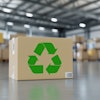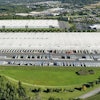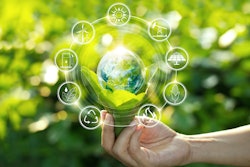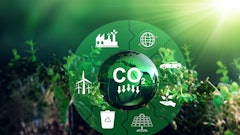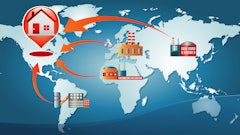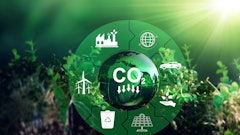
Maintaining a sustainable food chain both upstream and down comes with a host of challenges and opportunities. On one hand, doing so protects people, product and plant, reduces waste, encourages a green economy and ensures the freshest of foods are transported in the safest, most efficient manner possible. Plus, it’s just good business practice.
On the other hand though, an aging infrastructure, a rise in grocery e-commerce and an influx in globalized sourcing continue to stress today’s cold chains.
So, how can companies continue to keep sustainability top of mind amid a global pandemic and continuous supply chain disruptions?
In Food Logistics’ June 2021 issue, editor-in-chief Marina Mayer talks with several industry experts about why sustainable food chains matter and how companies can obtain the supply chain visibility needed to effectively maintain a sustainable food chain.
Here’s an interview with Rachel Schwalbach, VP ESG for C.H. Robinson, with excerpts publishing in Food Logistics’ June 2021 issue. [CLICK HERE to read the article in full].
Food Logistics: From your vantage point, what are some of the main sustainability-focused challenges today’s cold food chains face? What should companies in the cold food and beverage space do to achieve sustainable food chains? Where do they start if they haven’t done so already?
Rachel Schwalbach: One of the biggest sustainability challenges supply chains face today is the ability to understand their carbon footprint. As we have found through investing in Emissions IQ™, you can’t fix what you can’t see nor can you manage what you can’t measure. The first step is gathering data and setting a baseline. How is your carbon footprint looking now, and where can you improve? Once you have an opportunity to evaluate your impact, that’s when you can start to make changes. Not only that, but Emissions IQ will save companies significant time, effort and money that they would spend estimating their carbon emissions. It could take businesses, or specifically shippers, thousands of hours to build an equivalent emissions measurement tool on their own. Our free, self-serve tool automatically calculates emissions, allowing customers to visualize carbon output, how their emissions trend over time and how they compare to their industry.
Food Logistics: To piggy-back on this, what are some of the solutions, efforts or initiatives in place to promote sustainable food chains and mitigate waste, etc.?
Schwalbach: Within Robinson Fresh, our fresh produce division, there are three focus areas for sustainability: Product, packaging and path to purchase. Within product, our goal is to reduce food waste by over three million pounds by 2021. We also will continue to invest in grower programs that support communities, such as Fair Trade.
Within packaging, our goal is to develop a range of sustainable packaging solutions, including recyclable packaging options across our product portfolio. We are a member of the Sustainable Packaging Coalition, and How2Recycle, in an effort to better understand the most up-to-date sustainable packaging options on the market.
Finally, for our path to purchase initiative, we are working to increase Robinson Fresh sustainable business practices and outcomes to guide customers through the process of network optimization for sustainability to offset their supply chain carbon emissions, which of course relates to our Emissions IQ efforts. We are also focused on our enterprise goal of reducing our operational emissions intensity by 40% by 2025, and we’re already halfway there.
Food Logistics: Sustainability still matters, even in a global pandemic. Why is this? (Think ESG efforts, renewable energy/packaging, modernization, automation and more).
Schwalbach: The COVID-19 pandemic further demonstrates why sustainability is so critical to the well-being of our communities and our planet. In 2020, supply chain disruptions from the pandemic were felt across the globe. As a logistics company, we play a vital role in bringing items like essential goods, medical equipment, supplies and food to people around the world. It is therefore fundamental to invest in efficiencies, modernization and the reduction of waste in the supply chain. In fact, it’s something we have been doing for decades for our customers. There is an inherent benefit to the environment when we focus on creating resiliency through sustainability, as well as a cost-savings advantage. Emissions IQ allows us to look at a company’s supply chain through a sustainability lens, so we can find opportunities to mitigate environmental impacts and improve efficiencies to improve our planet and their bottom line.
Food Logistics: How does the Biden Administration’s Climate Change Action Plan and re-joining of the Paris Agreement impact the current and future status of sustainable food chains?
Schwalbach: The Biden Administration has made it clear that climate change and protecting the environment are critical initiatives. With Emissions IQ, we’re making it possible for companies to understand how and where they can do their part. The figures we calculate will give them the momentum to create change and track progress against their sustainability goals. In fact, being accredited to use the Global Logistics Emissions Counsel (GLEC) framework, Emissions IQ gives shippers data that’s trusted and universally accepted, and is more closely aligning to the Paris Agreement goals. We are accredited to use the only globally recognized methodology for consistently calculating and reporting the carbon footprint of a multimodal supply chain. With carbon emissions data always available in our self-service tool, companies can instantly report to regulators, governments, business partners and investors.
Food Logistics: What kinds of technologies/solutions (i.e., Internet of Things, automation, etc.) is your company investing in and why?
Schwalbach: We are investing in our own technology incubator, Robinson Labs, which was established by C.H. Robinson in 2020 as part of its five-year $1 billion investment. Robinson Labs developed and recently launched a sustainability-focused technology, Emissions IQ. This is the first self-serve tool in the industry that gives companies instant visibility into their carbon emissions across all transportation modes globally. It allows shippers to visualize their carbon output, optimize decision-making and prioritize action steps, whether in early or advanced stages of their company’s carbon reduction efforts. Emissions analysis across all transportation modes is available from C.H. Robinson now, and all modes will be available within the self-serve tool once ocean and air are added later this year.
As previously stated, we invested in this technology to help shippers save time, effort, and money in measuring their carbon emissions. Without this tool, it could take thousands of hours to build an equivalent emissions measurement tool on their own. Our free tool automatically calculates emissions for a clear visual of a company’s Scope 3 transportation emissions, how their emissions trend over time and how they compare to their industry. Emissions IQ is accredited to use the GLEC framework, which gives shippers data that’s both trusted and universally accepted. With carbon emissions data always available in our self-service tool, companies can instantly report to critical stakeholders.
Food Logistics: What does the future of sustainable food chains look like? Any risks/rewards?
Schwalbach: The future of sustainable food chains looks diverse. Whether it is leveraging more local food sourcing, or smarter supply chains, there is likely a combination of both for the future. The advantage of local is less miles on the road and a product that is known to grow in your region. The downfall of local is often a lack of diversity in product availability. This diversity is achieved by sharing and moving food from strong production regions and moving it to areas where consumers are eager to consume it. With longer supply chains, however, we have to be smart how that food is moved. Because we are a global logistics company, we take into consideration what the smartest supply chain solution might be, which also often means the most sustainable option.
Food Logistics: What are some things not addressed above that may be pertinent to our readers?
Schwalbach: According to the U.S. Environmental Protection Agency (EPA), an organization’s supply chain can account for 75% of their greenhouse gas emissions, and transportation emissions are a significant part of that. This figure not only represents significant environmental impact, but it also represents a tremendous opportunity to find efficiencies, smart solutions and cost-saving advantages. Being environmentally conscious can benefit both the environment and the bottom line.



